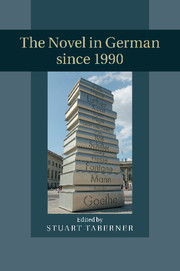Book contents
- Frontmatter
- Contents
- Contributors
- Acknowledgements
- Introduction: The novel in German since 1990
- Chapter 1 Robert Schindel???s Geb??rtig (Born-Where)
- Chapter 2 G??nter Grass???s Ein weites Feld (Too Far Afield)
- Chapter 3 Thomas Brussig???s Helden wie wir (Heroes Like Us)
- Chapter 4 Christa Wolf???s Medea. Stimmen (Medea. A Modern Retelling)
- Chapter 5 Zafer ??enocak???s Gef??hrliche Verwandtschaft (Perilous Kinship)
- Chapter 6 Monika Maron???s Endmor??nen (End Moraines)
- Chapter 7 Martin Walser???s Ein springender Brunnen (A Gushing Fountain)
- Chapter 8 Michael Kleeberg???s Ein Garten im Norden (A Garden in the North)
- Chapter 9 Christian Kracht???s Faserland (Frayed-Land)
- Chapter 10 Elfriede Jelinek???s Gier (Greed)
- Chapter 11 Karen Duve???s Dies ist kein Liebeslied (This Is Not a Love-Song)
- Chapter 12 Herta M??ller???s Herztier (The Land of Green Plums)
- Chapter 13 W. G. Sebald???s Austerlitz
- Chapter 14 Walter Kempowski???s Alles umsonst (All for Nothing)
- Chapter 15 F. C. Delius???s Mein Jahr als M??rder (My Year as a Murderer)
- Chapter 16 Yad?? Kara???s Selam Berlin
- Chapter 17 Daniel Kehlmann???s Die Vermessung der Welt (Measuring the World)
- Chapter 18 G??nter Grass???s Beim H??uten der Zwiebel (Peeling the Onion)
- Select bibliography
- Index
- References
Chapter 13 - W. G. Sebald???s Austerlitz
Published online by Cambridge University Press: 07 September 2011
- Frontmatter
- Contents
- Contributors
- Acknowledgements
- Introduction: The novel in German since 1990
- Chapter 1 Robert Schindel???s Geb??rtig (Born-Where)
- Chapter 2 G??nter Grass???s Ein weites Feld (Too Far Afield)
- Chapter 3 Thomas Brussig???s Helden wie wir (Heroes Like Us)
- Chapter 4 Christa Wolf???s Medea. Stimmen (Medea. A Modern Retelling)
- Chapter 5 Zafer ??enocak???s Gef??hrliche Verwandtschaft (Perilous Kinship)
- Chapter 6 Monika Maron???s Endmor??nen (End Moraines)
- Chapter 7 Martin Walser???s Ein springender Brunnen (A Gushing Fountain)
- Chapter 8 Michael Kleeberg???s Ein Garten im Norden (A Garden in the North)
- Chapter 9 Christian Kracht???s Faserland (Frayed-Land)
- Chapter 10 Elfriede Jelinek???s Gier (Greed)
- Chapter 11 Karen Duve???s Dies ist kein Liebeslied (This Is Not a Love-Song)
- Chapter 12 Herta M??ller???s Herztier (The Land of Green Plums)
- Chapter 13 W. G. Sebald???s Austerlitz
- Chapter 14 Walter Kempowski???s Alles umsonst (All for Nothing)
- Chapter 15 F. C. Delius???s Mein Jahr als M??rder (My Year as a Murderer)
- Chapter 16 Yad?? Kara???s Selam Berlin
- Chapter 17 Daniel Kehlmann???s Die Vermessung der Welt (Measuring the World)
- Chapter 18 G??nter Grass???s Beim H??uten der Zwiebel (Peeling the Onion)
- Select bibliography
- Index
- References
Summary
It would be odd to publish a collection of essays on the novel in German since 1990 and omit internationally acclaimed writer W.G. Sebald. A German writer working as an academic in the UK since the late 1960s, his literary and essayistic output, which coincides with the recent boom in memory studies in the humanities, has been a source of intellectual fascination since the early 1990s. And yet the generic term ‘novel’ does not accurately describe any of Sebald’s works. Indeed, in the case of Austerlitz, the subject of this chapter and the last work to be published before his untimely death in 2001, Sebald clearly rejected the term ‘novel’, describing the narrative instead as a ‘prose-book of uncertain form’. Where his earlier works had been more clearly autobiographical – although they too were ‘uncertain’ in the sense that they transgressed generic boundaries between document, fiction, memoir, travelogue – Austerlitz, because it both widened the gap between author and narrator and focused on the life story of a single protagonist, was nonetheless viewed as the most novelistic piece of writing Sebald had produced.
Sebald’s rejection of the term ‘novel’ is worthy of closer examination because it reveals much about the genesis of Austerlitz against the backdrop of debates on the status of literature after the Holocaust. Now considered to be a canonical work of Holocaust fiction, Austerlitz is principally the story of an ageing male protagonist, Jacques Austerlitz, who late in life begins to discover his traumatic past. The son of a Czech-Jewish couple who sent him to England through the Kindertransport, an organised rescue operation to save Jewish children at the start of the Second World War, he has no personal recollection – until a breakdown in the early 1990s – of this event, of his real parents and early years in Prague. Apart from a vague but persistent sense of being haunted, this memory deficit means that he lacks an instinctive emotional connection to his past. Rather he is dogged by a sense of being in a false life and has thus always been a loner, melancholic and prone to depression-related illnesses.
- Type
- Chapter
- Information
- The Novel in German since 1990 , pp. 195 - 210Publisher: Cambridge University PressPrint publication year: 2011
References
- 2
- Cited by



